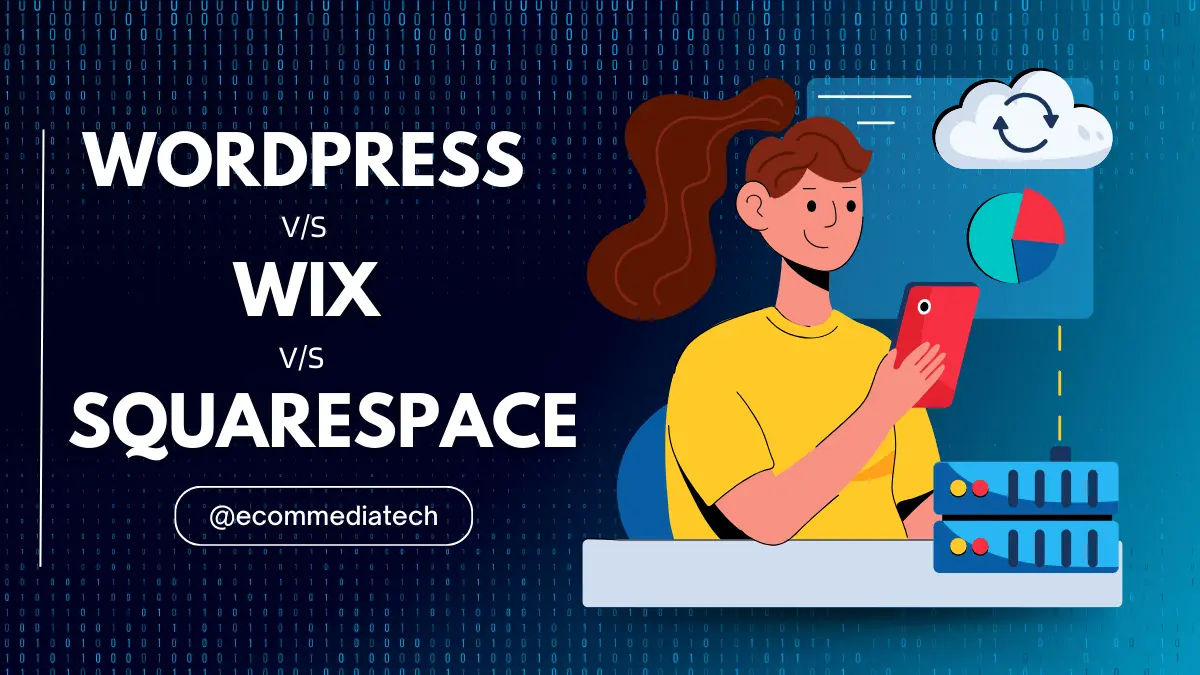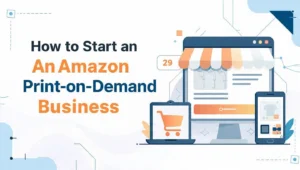Opting for the right website platform can ensure that you have a successful online existence in 2024. In 2024 there are three main giants expected to continue to lead: WordPress, Wix, and Squarespace. Each platform has its own characteristics and advantages, which are suitable for different groups with skill levels and demands. In this detailed comparison we will have WordPress, Wix, and Squarespace, the comparative strengths and weaknesses to help you determine which best platform in 2024 is your ideal choice for a website.
Overview of Each Platform
- WordPress: Globally, WordPress is the most popular content management system (CMS), supporting more than 40% of all websites. It is an open source platform that provides a flexibility unbeatable, wide variety of plugins and full control of customization. WordPress comes in two versions WordPress.org (self hosted) and WordPress.com (hosted).
- Wix: It is known for its ease of use, offering hundreds of beautiful templates and a range of apps for any need you can imagine. It is configured so that, for instance, making changes on one site will automatically be reflected on all others. And Wix even has its own domain name in case you want to master Internet terminology.
- Squarespace: Squarespace is ideal for users who value beauty together with ease of use in building sites. It has superbly designed templates, an uncluttered interface suited to creative and small business pursuits, all making the perfect package for Web 2.0 business. Squarespace is its own integrated solution equipped with everything from hosting to design to eCommerce; no additional tools are needed at all.
Ease of Use
- WordPress: WordPress has a steep learning curve for novices but once that hurdle is surmounted it offers unparalleled versatility. If you are operating a website with WordPress, then you have total control over it. However, none of this freedom comes without maintenance needs and, for good measure, backup currently needs doing manually. Gutenberg block editor makes content significantly more intuitive., but users will hence still have to get used themes and plugins or they may need to find in the options available for further customizing their website.
- Wix: Their essential user friendliness, moreover, also manufacturers for those without serious technical abilities in the computer industry! In addition to providing a clear drag and drop editor that allows you to position elements wherever you like on the page and preview results at any moment in real time Wix is an AI powered website builder and Wix ADI. Based on your answers to some simple questions it can create a whole site for you in only a few short minutes. Nevertheless, Wix’s flexibility is not coming close to what you really need alongside a vast array of bits and pieces in the toolbox.
- Squarespace: Squarespace finds the middle ground between being easy to use and providing for your creativity. Its interface is more organized than Wix’s, something that caters to users who lean out and enjoy a guided contest. However, the design editor is Squarespace’s beauty and curse. You have the freedom of making great changes to your layout that come with it not being as flexible as WordPress. But for those who wish to have a visually stunning website effortlessly at hand, there are always drawbacks.
Design and Customization
- WordPress: Thousands of themes and countless customization options are available in WordPress. With its flexibility, whether you want to build a blog, portfolio, online store or business website, WordPress helps you to design a site that matches exactly what you need. Using page builders like Elementor or Beaver Builder means you can design complex layouts without writing any code at all. The possibility for design is even more extended by Custom CSS and plugins.
- Wix: Wix has more than 800 cloth templates that are adapted to various products and styles of the company. However, in contrast to WordPress themes, Wix templates are visually attractive and easier to use for customizing the header footer area only. If you select an exactly matched template and want to take your website onto another page with the same colors in that direction, well too bad! Wix design flexibility is appropriate for most but advanced customization options are lacking.
- Squarespace: Squarespace for web is famous internationally for its clean design, easy to use interfaces, and responsive web templates favored by creatives such as photographers, artists, designers and so on. This platform offers great design experience with templates that are a snap to adapt through its modular, visual editor. But it doesn’t possess the same degree of customization as WordPress, and users looking for a particular design feature like underwater wave patterns or Tromso symmetrical shapes may not find them on Squarespace.

eCommerce Capabilities
- WordPress: With plugins such as WooCommerce, WordPress can be transformed to an excellent eCommerce site. WooCommerce is highly configurable and supports a wide variety of payment gateways, shipping options and management tools for inventory. However, the advanced features of these kinds make it ideal for those who need a sturdy and capable online store. However, setting up and maintaining a WooCommerce store requires more effort as well as technical knowledge than other products like Wix and Squarespace.
- Wix: You can easily run a small to medium sized store online with Wix’s eCommerce functionality. It includes flexible shopping carts, rich payment gateways and standard tools to promote your products like image module, discount cards and inventory management. Wix offers extra ecommerce features in its application market. To be sure it is not the same level as WooCommerce, Wix’s ecommerce capability is generally decent enough for many small businesses.
- Squarespace: The design feature, integrated with solid ecommerce solutions, knocks out Squarespace for a winner in this category. This winner is an excellent selection for those companies that are just beginning to take baby steps into the online marketplace because it is able to manufacture visually captivating stores with little initial fuss. Product variants, inventory management and multiple payment gateways distinguish Squarespace. But it lacks some of the advanced features that WooCommerce offers so it’s better suited to smaller shops or ones that are concerned with aesthetics.
SEO and Performance
- WordPress: WordPress offers strong SEO capabilities via plugins like Yoast SEO and All in one SEO. The detail control provided by them includes meta tags, XML sitemaps, breadcrumbs, right down to your connection settings. The open nature of WordPress also means that you can apply more advanced optimizations such as a lighter load on the server, mobile responsiveness for all types of readers and generally improved site performance. Nevertheless, to succeed in SEO with WordPress we require an understanding of how search engines work and also the contents of some SEO plugin author configurations.
- Wix: Wix has undergone substantial improvements of its SEO for many years. It offers built in SEO tools that include customizable meta tags, alt text and URL slugs. Wix also offers a special Wiz tool of its own, helping users start by guiding them through the essentials of optimizing their site. While Wix is enough to fulfill the basic SEO needs, it is not capable of providing the depth and flexibility of more higher level SEO strategies that are found on WordPress.
- Squarespace: Squarespace’s SEO features are solid but not as open as those of WordPress. It provides basic SEO tools such as meta tags, alt text and clean URLs. Squarespace also provides sitemaps automatically, such that all sites will have SSL certificates, a good thing both for security and for SEO. However, for the user who wants to get into really technical SEO Squarespace doesn’t allow a certification from Google to be directly added to the site, or a number 301 redirects made.
Pricing
- WordPress: You don’t pay any charge to use its software WordPress.org, but you’ll still incur expenses such as hosting fees, domain registration and buying premium themes or plugins for it. The expense may take many forms depending on your hosting provider and the specific tools you might require. At WordPress.com, there are various levels of pricing offering different degrees in functionality that you can include. In conclusion, WordPress is what you make of it from the cheapest host costing only $1 per month all the way to hundreds for special support and performance features.
- Wix: Wix offers a free plan that comes with Wix branded ads, but most users will choose to take one of the premium plans which start at $14 per month. The high level plans, such as Business and eCommerce are available to the individual who wants more from their website. Various benefits include more storage space or online payment options; Business has no Wix Advertisements shown at all other than that what you see is how it appears. Wix prices are uncomplicated to understand, but it becomes costly as you start adding more apps and features.
- Squarespace: Squarespace’s plans are available for as low as $16 per month but it offers options that suit different people. Of all the commercial services offered by Squarespace, Business and Commerce plans offer more advanced features in the way of eCommerce, marketing tools and analytics. There is no free plan with Squarespace, but they do offer a free trial limited to 14 days. Given the quality of both design and features, Squarespace’s pricing is quite fair overall.
Support and Community
- WordPress: WordPress is fitted with a huge community of users、developers and experts. This means that help is close at hand on all kinds of forums、both official & temporary third party software downloads sites like BitPort or Tixati’s script repository. But the self hosted version of WordPress does not have official service on PHP FPM memory usage or security issues. For anyone wanting instantaneous help, most hardware manufacturers are managed WordPress hosting providers with dedicated support. According to their plan, WordPress.com users can obtain official support.
- Wix: Wix has a customer support team that works for you day and night. Not only can they answer inquiries through email round the clock, but they also have a large help center and busy community forum. Many problems can be solved by reading the extensive documentation and tutorials that are offered by the user-friendly Wix platform. Wix’s support is another of its strengths. In particular, it is good for novices.
- Squarespace: Squarespace is always happy to help. While the live chat service operates only during business hours, they answer emails 24 hours a day and in the knowledge base you will find more guides and videos than anywhere. The speed and quality of Squarespace’s services make it a reliable option when help may be needed.

Final Thoughts: Tailoring the Choice to Your Needs
- For Bloggers and Content Creators: Yet if your entire goal of using a platform is to make money, and certainly one may naturally wish to generate income at some future point with their blog, WordPress is probably the best choice after all. With its wide variety of plugins and themes, you can build a decent blog using WordPress easily and quickly. What’s more is that WordPress has an extremely strong community support system meaning that you will never run out of resources or good advice.
- For Small Business Owners: On the other hand, if you are a small business owner who wants to put up your professional looking website at breakneck speed without ever having to worry about technical details then Wix certainly suits you. All it takes is getting used to one of the drag and drop editors for designing pictures, after which you can throw together a site that is both beautiful and functional. Wix’s eCommerce capabilities are also adequate for small businesses that stock a smaller range of goods and have fewer complex needs.
- For Creative Professionals: Squarespace is the ideal platform for people who showcase their work online. For architects, industrial designers, paint staff in companies and musicians, all of its beautifully designed modern web pages make a trip here to rest As far as website design goes. Constructing an exquisite portfolio or attractive online retail site that stands out above all others becomes effortless with their astonishing templates and design features.
- For eCommerce Entrepreneurs: If you want to run an online store with full eCommerce features WordPress with WooCommerce is superior. It requires more setting up and servicing, though the flexibility and scalability of WooCommerce allows even sites built for large businesses to profit from it. Those who require a simpler option will find Squarespace or Wix to provide relatively user-friendly ecommerce choices, albeit lacking some of the sophistication of WooCommerce.
- For Developers and Agencies: But if you are a developer or manage a website design company, then nothing beats WordPress for flexibility and control. WordPress being open source means you can make really tailor made solutions for clients, no matter what the design constraints may be. With Wix and Squarespace, what you see is pretty much what you get. It’s great for people who don’t need advanced coding skills and who want something quick and out of the box.
Looking Ahead: The Future of Website Platforms in 2024
As they step into 2024, website platforms are recording steady progress with each new feature and technology it adopts; this makes things that much more convenient for users to browse, safer in terms of cyberattack worthiness scores, and allows them great tools to design their work. With AI integration, improved mobile responsive tools and advanced SEO aids, every platform is evolving to satisfy its users’ requirements.
- WordPress, with its open source nature and large community development model, will probably continue to dominate the market. Look for new and exciting themes, plugins, and integrations coming down the pike especially in areas like AI driven content creation; enhanced security features are in store as well for both developers and publishers themselves.
- In the future Wix will concentrate on further simplifying the website building process, so that people who are not tech savvy can still create professional web pages. Changes in AI, as well as the enlargement of its app store, will likely be its main focus of development.
- Squarespace will stand still in the future serving creatives and small businesses, the emphasis on design and aesthetics possibly becoming even stronger. Future updates could include easier third party commerce facilities, better linking with social networks or primary marketing channels.
Making Your Decision
Ultimately, the best platform for you in 2024 depends on your individual needs, goals, and technical comfort level. Consider the following:
- Budget: Not only do you have to budget for the initial build of your site, but also ongoing maintenance, hosting and any premium features that you may need.
- Scalability: In the long term goal, for example if you want to grow significantly in the coming years, check whether your chosen system will allow scaling up.
- Customization: Decide how much control you want to have over the look or function of your site. And if you need extensive customization, WordPress is unparalleled.
- Ease of Use: If you want a solution that is basically zero effort to get started and maintain, look to Wix or Squarespace.
- Support: Assess how much support you would require WordPress has a big community, while Wix and SquareSpace offer more direct customer help.
Which Platform is Best for 2024?
Choosing between WordPress, Wix, and Squarespace ultimately depends on your specific needs, technical skills, and long term goals:
- If you need maximum flexibility,advanced features and complete control of your site, WordPress is the best choice for you. It is ideal for larger projects, complex sites,comfortable with a steeper learning curve.
- When you’re a new or small business which emphasises convenience and freedom from excessive customization on websites Wix is an excellent option. It’s perfect for all those people who want simplicity as well as convenience but allow them enough flexibility that they can get work done easily without ever being confused about what their next step might be, etc.
- If you are a creative or a small business that values design and aesthetics, Squarespace is the platform for you. It offers an all in one solution to beautiful websites without knowledge of deep technical details.
Conclusion
Entering 2024, they are all three platforms which continue to thrive, offering a range of full featured tools for different user types. So think long and well before making your choice the platform you choose should match exactly what sort of website you will be creating in 2024.
By measuring all of these elements against one another, you can confidently choose the platform that will both satisfy your needs now and be capable of living comfortably with you well into the future. The critical goals for a 2024 platform are whether it aligns with your vision and how it helps you achieve them. Whether that means WordPress, Wix or Squarespace is immaterial as long as your chosen platform allows the site we have decided on together to come into being anyway and prosper in the end.
FAQs
Which is better, Squarespace or Wix or WordPress?
- WordPress is best for flexibility; Squarespace excels in design; Wix is easiest for beginners.
Is it better to use Wix or WordPress?
- WordPress offers more customization, while Wix is easier for quick, simple setups.
Should I learn Squarespace or WordPress?
- Learn WordPress if you want more control and customization; Squarespace if you prioritize ease of use and design.
Why use Squarespace over Wix?
- Squarespace is better for stunning design and all in one solutions.
Which website is better than Wix?WordPress offers greater flexibility and scalability than Wix.
















